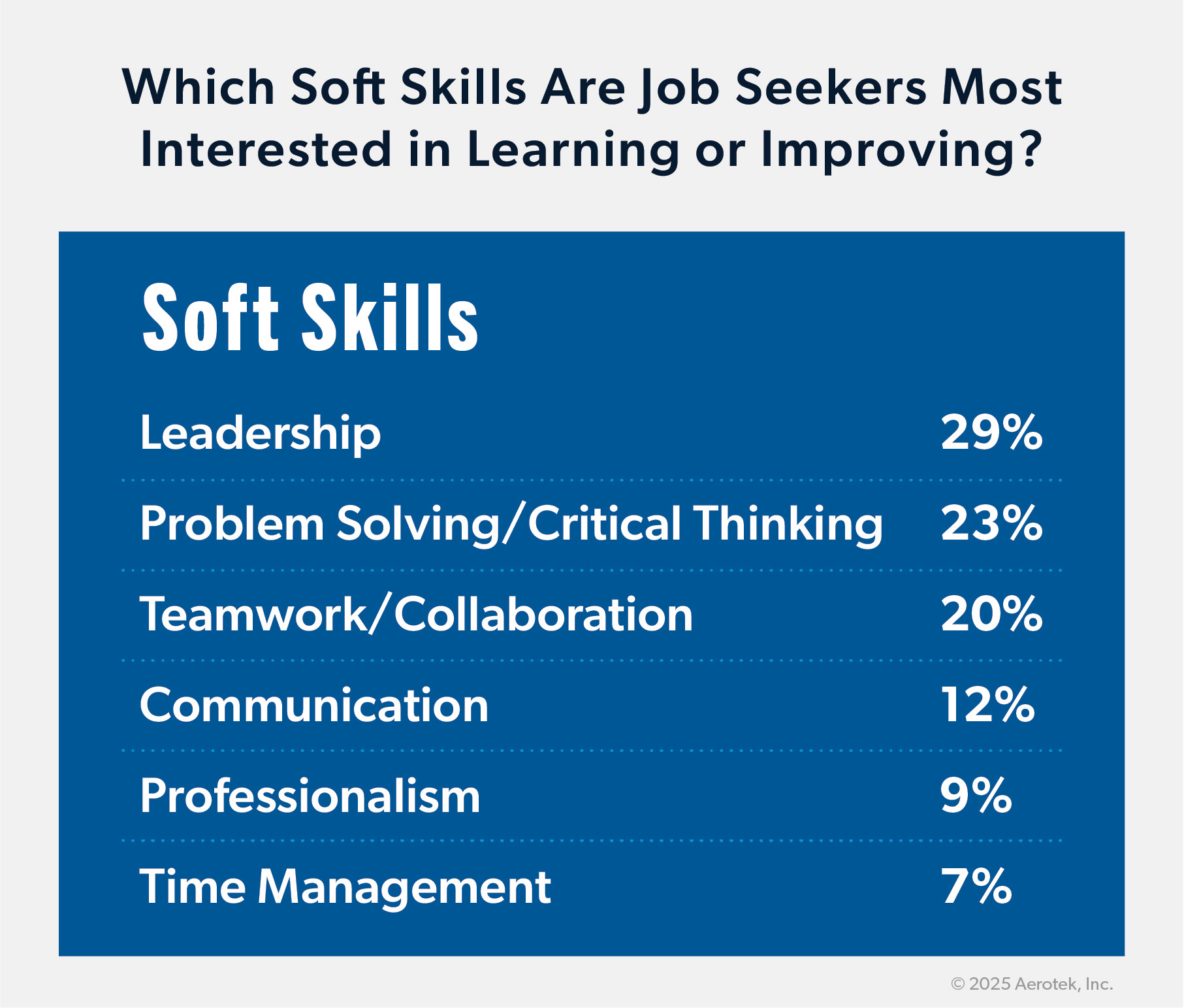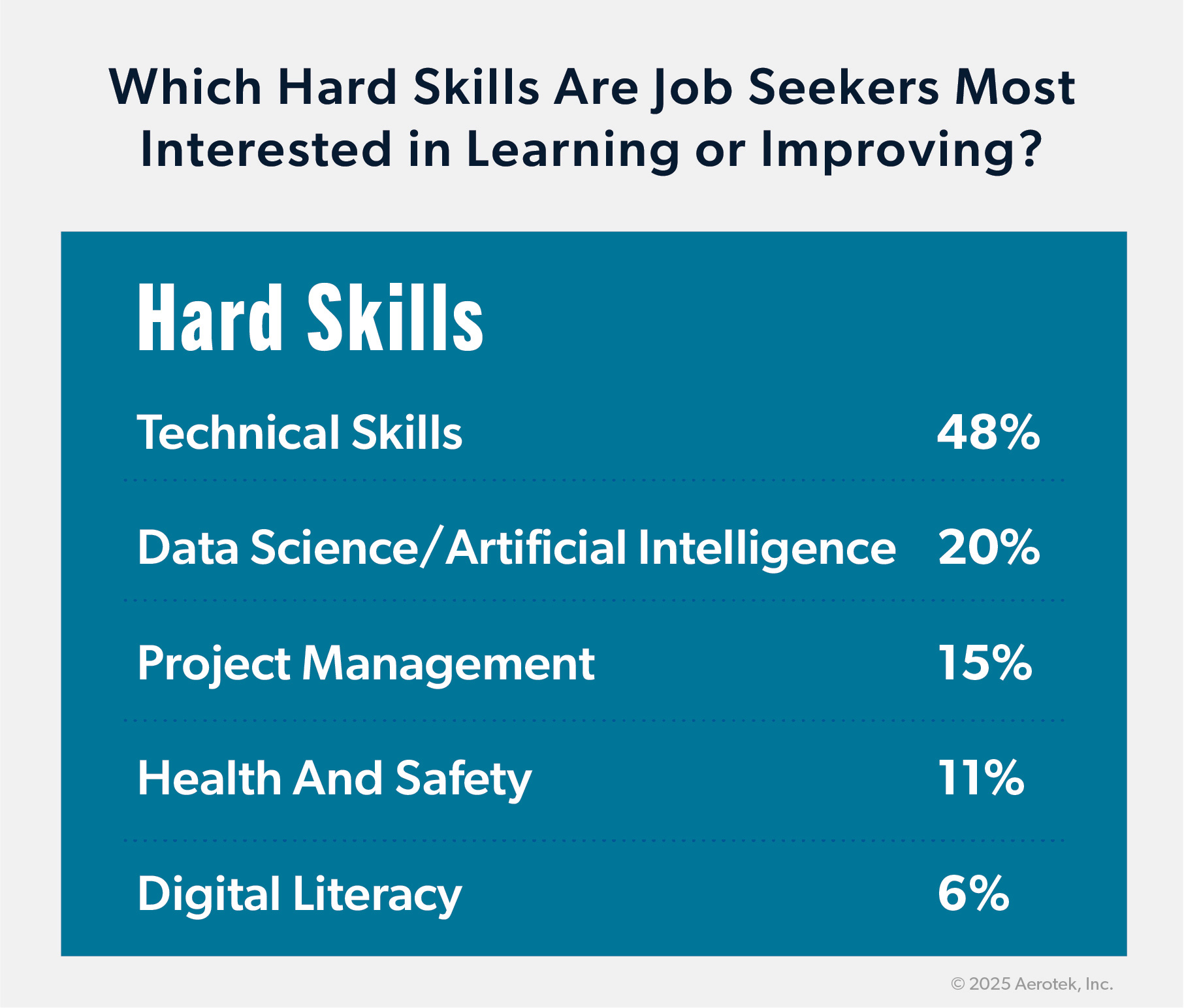Job Seekers Prioritize Improving Their Leadership and Technical Skills
Our latest Job Seeker Survey reveals that 73 percent of respondents expect their employer to provide opportunities to add new skills — yet only 48 percent received such training in their current or most recent position.
In today's competitive job market, it’s essential for employers to recognize the need for their workers to sharpen their skills to stay ahead. Leadership and technical skills top the list of priorities for job seekers. By understanding these priorities, employers can refine their skill development strategies, ensuring they meet the expectations and aspirations of their workforce.
Which Soft Skills Matter to Workers?
Employers play a critical role in fostering a resilient and high-performing workforce by recognizing the value of soft skills. Soft skills are personal attributes that enable someone to interact effectively and harmoniously with others. They are essential in the workplace, and employers must acknowledge the growing demand for these skills among job seekers.
The Soft Skills That Matter Most
• Leadership: Most respondents stated they are interested in improving their leadership soft skill. Even if a candidate isn't in a managerial position, leadership skills are valuable. Workforce training that focuses on leadership development can prepare employees for future roles and responsibilities.• Problem-Solving: Job seekers understand that companies want to hire workers who can display critical thinking and have a capacity to analyze situations and come up with solutions. Helping workers develop these skills can help in them in their current and future roles.
• Teamwork: The ability to work well in a team is another essential soft skill. Job seekers are looking to enhance their collaborative abilities, build stronger team relationships and contribute positively to group projects.
• Professionalism: Cultivating professionalism within a workforce is critical as it fosters a culture of respect, reliability and ethical behavior. Employees who exhibit professionalism are more likely to avoid absenteeism and more likely to build trust with colleagues, clients and other stakeholders, which can lead to improved performance and organizational success.
• Time Management: Effective time management skills allow employees to prioritize tasks, avoid procrastination and meet deadlines, which can significantly enhance productivity and reduce stress. Developing these skills within your workforce can lead to more efficient operations and a better work-life balance.
Which Hard Skills Are Job Seekers Prioritizing?
Hard skills are specific, teachable abilities or knowledge sets that are often job specific. For skilled trades and general labor, these skills are critical as they directly affect job performance and efficiency.

The Hard Skills That Matter Most
• Technical Proficiency: In skilled trades, candidates seek to improve their technical skills related to their specific field, such as machinery operation, welding or electrical work. For employers, upskilling workers to develop more technical skills not only improves retention, but it can also help them fill the skill gaps in their workforce that current exist and those on the horizon.• Data Science: As technological advancements continue to evolve, many workers prioritize skills related to artificial intelligence, cloud computing, remote operations and data analysis. Even in industries like manufacturing and facilities management, these skills are becoming increasingly important as automation transform equipment and systems.
• Project Management: Project management is an important hard skill for workers as it enables them to efficiently plan, execute and oversee projects, ensuring that objectives are met within deadlines and budgets. Many of the survey respondents work in project-based industries like construction and facilities management. In these industries, strong project management skills contribute to better resource allocation, risk management and team coordination, leading to successful project outcomes and higher client satisfaction.
• Health and Safety: Safety is paramount in skilled trades and general labor. Workers want to stay informed about the latest safety regulations and practices to ensure a safe working environment. Continuous health and safety training can even increase employee engagement.
• Digital Literacy: With the increasing integration of technology in various trades, digital literacy has become vital. Training in software tools, data management and digital communication is highly sought after.
Skill Development Preferences Vary by Role
Respondents to our Job Seeker Survey are recent applicants for general labor and skilled trades openings in construction, manufacturing, logistics, aviation and facilities and maintenance. While both groups share similar training preferences, there are some noticeable differences.
General and light industrial workers tend to focus more on teamwork and communication, whereas skilled trades workers place greater value on leadership and problem-solving skills. Both groups recognize the importance of these competencies, though their preferences indicate subtle variations based on their roles and industry demands.
When it comes to hard skills, general labor workers have a slight preference for health and safety training, while skilled trades professionals prioritize project management skills. These distinctions underscore the need for tailored workforce training programs that address specific industry requirements and enhance overall workforce capabilities.
Job seekers clearly expect their employers to provide skill development opportunities. Besides pay, job seekers are largely motivated by job security and the potential to add new skills. Ongoing workforce training is vital for employee retention and skill development. By understanding and addressing the specific preferences of candidates, employers can create a motivated and skilled workforce. Providing opportunities for both soft and hard skill development will not only attract top talent but also ensure that the organization remains competitive and resilient in a rapidly changing job market.
